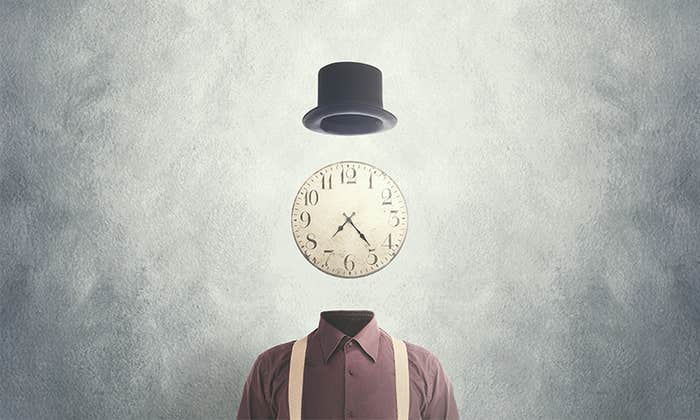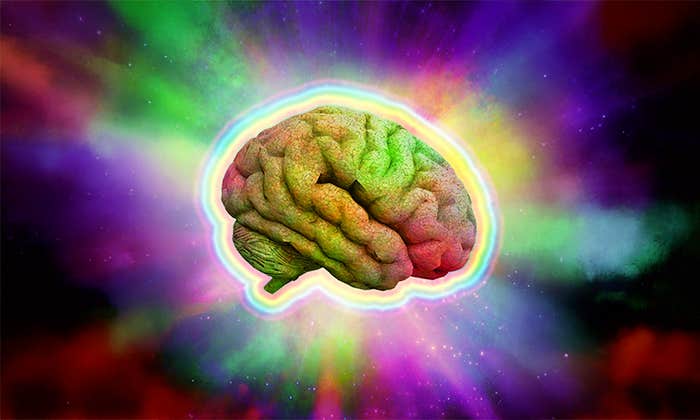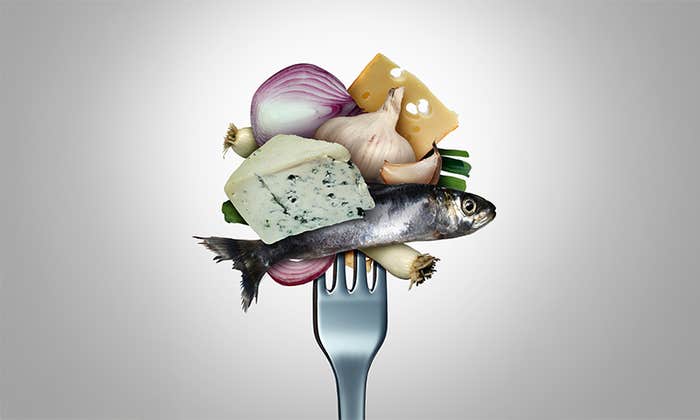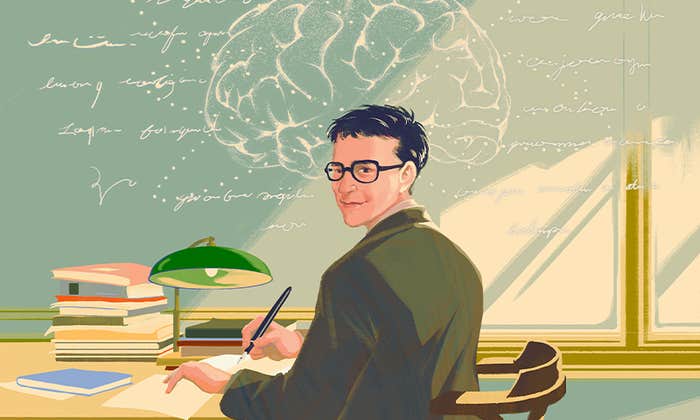An hour into my interview about sex and love with Helen Fisher, she said, “You’re getting me to say a whole lot of things I never get to say.” Her tone wasn’t exasperation but, I think, gratefulness. She seemed to enjoy the opportunity to take on some of the scientific dissent that her best-selling books about the biology of love, including, most recently, Why Him? Why Her? How to Find and Keep Lasting Love, have stirred up.
At her elegant apartment on Manhattan’s Upper East Side, encased by books, stacks of CDs (a Roy Orbison retrospective was on top), and haunting abstract paintings by her identical twin sister, Lorna, Fisher was a pleasure to talk to. For somebody who has made a living answering people’s most intimate questions about love and relationships, I was enamored by her own self-evaluation. “I’ve never cared slightly who I am,” Fisher said. “I’ve never been to a psychiatrist. I’m just flat-out not interested in who I am.”
Earlier this month we featured Fisher’s essay, “Casual Sex May Be Improving America’s Marriages,” on Nautilus. It generated a raft of comments, some that agreed with Fisher and others that, well, didn’t. The article’s thesis is summed up in the title and is based on 25,000 questionnaires to American men and women. Fisher, Ph.D., is a biological anthropologist and Senior Research Fellow at the Kinsey Institute. She is also the chief scientific advisor to Match.com, an Internet dating site, which has employed her study, the “Fisher Temperament Inventory,” which divides people into four personality types, on its pages. Does her association with the commercial site undermine her scientific objectivity? “All of my academic work is totally independent of Match.com,” she said. “I’m not for sale.”
Fisher sees relationships through the lens of biology and her insights can feel like a shot of truth serum. “Love is an addiction—a perfectly wonderful addiction when it’s going well, and a perfectly horrible addiction when it’s going poorly,” she said. But does her focus on biochemistry shove culture too far out of the picture? Can we really sculpt people out of brains scans and questionnaires? As I said, Fisher was anxious to answer.
What do you mean that “our brain is soft-wired to slowly attach to a partner?”
Brain scans aren’t always precise, right? Couldn’t the same areas activated by photos of loved ones be activated by photos of sports stars?
What is the “pre-commitment stage?”
Why is a rapid commitment “more risky to long-term happiness” than casual sex?
Can’t the intense bond of sex get in the way of knowing somebody?
On the other hand, isn’t casual sex sometimes just that—casual? People don’t want to make a commitment.
Has “slow love” reduced the divorce rate?
Why do we have sex?
How then do you explain the sex drive of gays and lesbians, or people who don’t want kids?
Is love only biochemical?
What do you say to critics who call your biochemical view of love reductive?
What are your “four primary temperament dimensions?”
How do you know people are drawn to people like themselves?
On questionnaires, are people really the best judges of themselves?
Which temperament type are you?
What type is your best match?
Don’t you think there’s a personal danger to labeling yourself a type?
What launched you on a career studying love and sex?
Did a transformative experience lead you to this field?
What would you be if you weren’t a scientist?
Interview Transcript
What do you mean that “our brain is soft-wired to slowly attach to a partner?”
I really discovered it. I and my brain-scanning partners discovered that. We have now put over 100 people who were madly in love into a brain scanner using fMRI. Our first study was of people who had just fallen madly and happily in love and we had 17 of them. We noticed that those who had fallen in love in the first eight months—[those] only in love for eight months or less—[had] a lot of activity in brain regions linked with intense feelings of romantic love; but those who had been madly in love for a longer period of time—from eight to 17 months—showed [additional] activity in a brain region linked with feelings of deep attachment. So just that one brain scanning experiment vividly showed us that the brain can easily fall happily and madly in love very rapidly, but feelings of deep attachment take time. So I often say romantic love is like a sleeping cat: It can be awakened at any time but attachment, those feelings of cosmic, deep, profound love for another person, takes time.
Brain scans aren’t always precise, right? Couldn’t the same areas activated by photos of loved ones be activated by photos of sports stars?
Okay. It’s a very good question. There are general paths in the brain, no question about it. And the path that we study is the “wanting” path, the reward system in the brain. And there are lots of different parts to it. When you want a piece of chocolate, that brain system becomes activated. When you want to get a raise at work, that brain system becomes activated. When you want to go on that go-cart at the summer roundabout, whatever, that brain system will become activated. There’s no question about it, there are general systems, but then when you—within that general system … For example, let’s say you want some ice cream. Food centers would become activated along with the wanting [centers]. When you’re thirsty and you want water, those wanting systems will become active along with specialized regions linked with wanting water. And when you’re madly in love with somebody, you have that general response, but you actually also have activity in a brain region linked with addiction.
We haven’t figured it out entirely but some neuroscientists believe that they’re the general systems and then there are specific systems and you tack on, in various ways, different forms of pathways so that you want different things and you yourself would admit that when you want water, you don’t really want cotton candy—you want water. And so that brain system is going to have some of the wanting system and something for water as opposed to cotton candy.
So it’s going to be vast ratios with vast networks but even a slight change in some of the network might make you want this rather than that. So it is my guess that as we know more and more about the brain we will see specialties so that no two “wanting” is exactly the same. So that’s the point, that there’s going to be general systems, no question about it, and specific systems.
For example, when we put people in the brain scanner we do two things: We have them look at a photograph of their sweetheart and [then] at a neutral photograph—a photograph that calls forth no positive or negative feelings at all. And between that positive and the neutral, we do what we call a distraction task. We give them a large number. They have to look at that number while they’re lying in the machine and, just in their head, count backward from that number in increments of seven. And we’re doing that in order to wipe out feelings of romantic love, just long enough so that we [can] get a clear picture of [their] brain in a resting state.
So anyway to answer your question, what’s going on in your brain when you’re in a resting state—and also when you are looking at your sweetheart—there are some brain regions that are going to become active under both circumstances, the brain regions linked with, “oh, it’s a face.” “Oh it’s round.” “Oh it has red in it.” “Oh it’s not moving.” There are all kinds of brain regions that will be activated under both circumstances. When you put the brain in love next to the brain in the neutral state, it cancels out what they have in common leaving only the brain in love. So over and over and over, scientists have been designing studies that enable them to measure very specific regions that are linked with very specific traits and characteristics. It has long been an argument in science. Is it all just general structures and then your environment says oh, you know, now this feeling is romantic love, and oh, now this feeling is that I like the chocolate? Or, are there specific regions in the brain? I think that both are probably going to be true, that under some circumstances it’s going to be a general reaction—your culture tells you that that’s the way you’re supposed to interpret that reaction, and so it’s a general brain response. In other particular circumstances, it’s not going to be a cultural thing—it’s going to be some sort of Darwinian mechanism that triggers a certain part of the brain along with basic brain structures. And it’s a very individualized brain system that has evolved for very particular reasons.
What is the “pre-commitment stage?”
I made up that term, “the pre-commitment stage,” and I also like the term, “commitment-lite”—that we gradually move into a heavier duty form of commitment. I think that everybody in this day and age is taking their own time, which I think is so beautiful. The fact that we can build our partnerships now really any way we want to build them is enabling for individuals, [allowing them] to express love in their own way according to their own time and [to] make up their decisions in logical ways that can help really build a partnership.
I think some people will become attached almost instantly, within a year, perhaps even within a few days, if you can really trust the person … Perhaps a lot of these people have known that person for quite a while. Perhaps they were deeply attached to them before they ever fell in love with them. So attachment can grow in any way.
You know, I think we’ve evolved three distinctly different brain systems for mating and reproduction. One is a sex drive; second one is feelings of intense, romantic love; and the third is feelings of deep attachment. People often think that well, it comes first with sex, then you fall in love, then you feel the deep attachment; but I think that you can know somebody at work, learn to respect them, understand their sense of humor, like every single thing about them, and begin to feel a deep sense of attachment to them. But you’re not in love with them. You’re living with somebody else or married to somebody else and so are they. Times change, they become single, you become single, and all of a sudden after a long period of deep attachment, that brain circuitry for romantic love can become triggered and you’ll fall madly in love. But I think generally speaking, people tend to fall in love first, and then slowly build a deep attachment to somebody.
Why is a rapid commitment “more risky to long-term happiness” than casual sex?
I’m not advocating that people have casual sex before they marry. To each his own. But you do learn a great deal about a human being between the sheets; and not just size and shape and smell and taste and touch, and sounds. You learn how flexible they are, whether they can change some of their habits to be attentive you, whether they’re eager to please you, whether they can listen, whether they can respond to your needs. So I think an awful lot of these people are having casual sex to get to know somebody as rapidly as they can before they become too attached to them and find that this is not the right person for them.
Can’t the intense bond of sex get in the way of knowing somebody?
It’s a wonderful question. Very definitely, casual sex is not casual. Unless you’re so drunk that you can’t remember it, it’s not casual. I mean you stimulate immediately, five of the 12 cranial nerves. You really see the person, smell the person, feel the person, taste the person, touch the person. So the brain is absorbing a great deal of data.
The problem is that any stimulation of the genitals can trigger dopamine activity and push you over the threshold into falling in love. And then with orgasm, there’s a real flood of oxytocin and vasopressin, and those are brain chemicals linked with feelings of deep attachment. So you can begin to have casual sex with somebody who you really don’t like or don’t respect or don’t trust; or it’s not the kind of relationship that you want to have long term, and you can trigger the brain circuitry for romantic love and feelings of attachment and suddenly you’re off to the races with the wrong girl or the wrong boy.
So yes, you are always taking a chance when you have casual sex—not just getting pregnant or getting infectious diseases, or losing your self-respect, or having your reputation in some way jeopardized, but you can fall madly in love with the wrong person and in fact I do a national study called, “Singles in America,” with Match.com. We don’t poll the Match population; we poll the American population. It’s a representative sample based on the U.S. census and in that sample, every year, I ask singles around the country—every walk of life, every background, every age group, every sexual orientation—“Have you ever gone into a one-night stand expecting only a one-night stand and then had that one-night stand turn into a long-term committed partnership?” And about 30 percent of people say yes, every year that I ask. So having sex with somebody, casual sex, can turn you off really fast; it can turn you on really fast; or it can be one of the first stepping stones towards a pretty logical relationship and we take our chances.
On the other hand, isn’t casual sex sometimes just that—casual? People don’t want to make a commitment.
There’s no question about it, that people don’t want to make a commitment. I mean all the way through the process they’re wearing their sneakers. They’ve got their sneakers on. I mean what is “friends with benefits?” They never go out in public. This is casual sex on the side—nobody sees this as a pair in public. Even when [you] live together, you know, you’re not wearing a wedding ring. You might not have his photograph on your desk at work. Even our modern marriages are enabling people to walk out fast. Civil unions, the French concept of the PACS, where you just fill out a form and you’re married and if you want to get unmarried, you just send in another form … So flexibility is the sign of the times along with slow love.
We are seeing all kinds of ways to make a partial commitment—“commitment-lite”—and of course, there’s going to be some people who aren’t interested in the attachment and that’s why they’re dragging their feet. No question about it. In fact, I once did a little poll on my own. I only had about 10 people that I polled. All these people were happily married. They had all been married [for] over 30 years and I asked them: Did you know you were doing the right thing as you were walking down the aisle? And 50 percent of them said they weren’t sure. I mean relationships are built; they’re not made overnight. And you can fall madly in love with somebody and then all of a sudden that begins to drain away and you see what you’ve got and you don’t want it. I once read that it takes at least 18 months to get to know some really basic things about a person. And some things you might not know about your partner for 30 years.
Has “slow love” reduced the divorce rate?
It’s impossible to really prove that mathematically, but the divorce rate peaked in 1981 and has been very gradually going down; and it’s very steady right now. It’s entirely possible that it’s steady because we’re spending so much time having our casual sex, having friends with benefits, [and] living together before we actually tie the knot. And in fact, I do have data from my Match.com studies. I did one study with Match.com on married people—not people on the Match.com site, of course—and I studied almost 1,100 of them and I asked them a lot of questions. But one of the questions [was]: Would you remarry the person that you’re currently married to and 81 percent said yes. And about 75 percent said they were still madly in love with that partner and I do think that as bad marriages end, we are going to see more and more good marriages.
Why do we have sex?
Well, it’s a very powerful brain system of course. A great deal of the brain just absolutely shuts down while you’re having an orgasm. And well, it’s the road to reproduction and it’s the road to sending your DNA on into tomorrow. As Darwin would have said, if you have four children and I have no children, you live on and I die out. The game of sex matters. The game of love matters. And the game of attachment.
How then do you explain the sex drive of gays and lesbians, or people who don’t want kids?
Sex can trigger the brain circuitry for romantic love and it can trigger the brain circuitry for deep feelings of attachment and even though you have no intention of having children, these are very primitive ancient brain systems that evolved long, long ago and they will be with us as long as we survive as a species. They’re not going to change. Just like the fact that we tend to eat meat. The tendency to eat meat, the drive to eat to meat, the craving to eat meat—all of the bodily abilities to eat meat evolved well, certainly, 2 million years ago if not 4 million years ago. And we have these embedded deep in the brain. Sex drive is not going to go away, even though you don’t want to have children.
I also think that sex is good for a lot of things other than having children. It relaxes you. It’s very good for bladder control and it’s good for the eyes. It’s good for the skin. It’s good for the muscles. It’s good for breathing. And it’s good as an anti-depressant. There are a great many chemicals in seminal fluid, including dopamine, serotonin, testosterone, estrogen, FSH, LH—various chemicals that keep the body in very good shape. Sex is good for you with the right person, even if you don’t have babies, and even if you don’t want to see them tomorrow.
Is love only biochemical?
Well, the reason that’s a difficult question to answer is [because] everything has a biochemical component. When you believe in God, there’s a biological component. When you’re cooking dinner, there’s a biological component. When you’re laughing at a joke, there’s a biological component. When you’re having a new idea, there’s a biological component. I mean, can you drive around in a car without the car? No, I don’t think so. You’ve got to have the car. You’ve got to have the brain. It’s got to be working in certain ways in order for you to feel this way or that way.
Can you change the way you feel? Sure. The brain is very flexible. In fact, I have long believed that the more we understand our biology, the more we will come to realize the power of cultural forces to change that biology, to change behavior. We can change our behavior. For example, some people are predisposed to alcoholism and they give up drinking. Some people are predisposed to eating too much and putting on weight and they stop eating. Some people tend to be lazy and they get to work every day and are very creative—but it’s not as natural to them as the next guy.
What do you say to critics who call your biochemical view of love reductive?
I say I could be standing here for the next two months talking about all the environmental things that go on. [But] the part of you that I’m interested in is the biological part and so that’s the part that I study. That’s what I’m trying to add to the community of ideas. We have a huge amount of psychological data about your childhood, the way you grew up, why you do the things you do, your cultural mechanisms. I mean, if we all grew in Iran, we’d be Muslim. Growing up in America, we’re not Muslim—most of us. Did we choose that? No, we didn’t choose that. It’s part of our culture—we emerged into a culture and are absorbing all kinds of its cultural credos etc. And that’s all quite interesting.
But as an identical twin, I’ve always wanted to know why we’re all alike, rather than why we’re all different. I used to live on the Navajo reservation and a lot of people would spend a lot of time saying how the Navajo are different from the Hopi, or the Zuni. Well, that’s very interesting. I want to know why the Navajo and Zuni and Hopi are all alike, why all humanity is alike. I’m interested in those questions and those answers. It’s only part of the puzzle, but it’s the part of the puzzle that has captivated me.
What are your “four primary temperament dimensions?”
I think that we’ve evolved four very broad styles of thinking and behaving linked with the dopamine, serotonin, testosterone, and estrogen systems. When I look through all of the medical literature—the last 40 years of medical literature—there’s all kinds of studies on doves and lizards and monkeys, and even people, watching behavior and the chemicals that respond with that behavior. And we now know there [are] a lot of chemicals in the brain that keep the eyes blinking and the heart beating; and [there’s] your swallowing mechanism; but they’re not linked with personality traits.
So I went to the academic literature looking for any trait linked with any biological system and as it turns out, there [are] four biological systems—each one of them linked with a constellation of personality traits. Now, we all have all four systems. We all are going to express some of the traits of all four systems, but we have personalities. For example, people who are very expressive of the dopamine system, I call these people, “explorers.” They tend to be novelty seeking, risk taking, curious, creative, spontaneous, energetic, mentally flexible, and they’re drawn to people like themselves. They want somebody who’s going to get off the couch and go off to Paris for the weekend with just their toothbrush.
How do you know people are drawn to people like themselves?
Because I created a questionnaire to measure the degree to which you express the traits linked with each of four of these biological systems, and that questionnaire has now been taken by over 14 million people in 40 countries—because it was put on the Match.com site internationally, and on the American Chemistry.com dating site. So about 30,000 people answered my questionnaire every three weeks and using IgA analysis and factor analysis I have been able to establish that the medical literature is correct, that indeed these traits are linked with the dopamine, serotonin, testosterone, and estrogen systems.
And then I did something that is one of the most important things I’ve ever done with my life. I put two groups of people into the brain scanner. I had them take my questionnaire first—to see which of the four they scored highest on—and then I put them in the scanner. As it turns out, people who scored highest on the traits linked with the dopamine system—novelty seeking, risk taking, curiosity, creativity—showed much more activity in a whole pathway of the dopamine system, proving that if you score high on that questionnaire in the dopamine system, it is linked with brain activity. Those who scored high on my serotonin scale I call “the builder”—I should have called them the “guardian” maybe—these people are traditional, conventional; they follow the rules, they respect authority, they like schedules and plans. They tend to be religious, and we found activity in a tiny little brain region that is linked with social norm conformity, which is the main characteristic of the serotonin system.
For the other two personality styles—those expressive with the testosterone scale and those expressive of the traits linked with estrogen—we found more activity in brain regions not only linked with analytical thinking and mathematical thinking, but also built by fetal testosterone. And those who scored high on my proposed estrogen scales showed more activity in the mirror neurons—linked with empathy—and other brain regions built largely with estrogen. So, to my knowledge, this is the first questionnaire that started from the biological literature—not the linguistic literature. The biological literature to make the questionnaire and then I went back to study the brain to prove that that questionnaire was actually measuring these four brain systems.
On questionnaires, are people really the best judges of themselves?
There are three ways that people can answer a questionnaire: with who they really are; with who they want to be; and with who they want others to think they are. I’ve never found any really good way of getting people to answer just as who they are. The one thing that I do know is that the kinds of questions that I ask are not the kinds of questions that are going to get you hired or fired. They don’t really have any motive for answering one way or another way, and there’s really no bad answer so at least, if you remove some of the motivations for people to lie, you’re better off.
Of course before I created any of my questionnaires, I really studied how you make a questionnaire and scientists know that the simpler the questionnaire is, the more likely you are to get a really straight answer. One of my questionnaires has been taken by 14 million people in 40 countries and under those circumstances, you really do see patterns. So a great many of the people who are trying to fool themselves or have fooled themselves will certainly be in the mix but mathematically, the trends are so powerful, the answers are so powerful that I think I’m capturing who you really are.
Which temperament type are you?
I’m a cookie-cutter type. I am so much less complicated than most of my friends. I am almost all dopamine and almost all estrogen. I am novelty seeking, risk taking, curious, creative, spontaneous, energetic. I’ve been to about 86 countries, foreign countries including the highlands of New Guinea, Iran, Saudi Arabia. This summer I will go to 11 more countries and the high estrogen, I cry easily, I feel everybody’s pain. It’s terrible. I cry at parades, it’s ridiculous. I hope I’m a good writer. I’m empathetic. The traits linked with the estrogen system are seeing the big picture, being intuitive and imaginative, being verbally skilled and socially skilled, being trusting—I’m way too trusting. But as it turns out, if you trust the right person, you save a lot of metabolic energy and this kind of high-estrogen person is pretty good at reading people so they actually are able to trust the right people. That’s why these personality traits come in constellations. You can’t really evolve trust without the ability to know who to trust and so you can see various traits evolving together. I’m fascinated with personality.
What type is your best match?
When I take a look at the men that I’ve gone out with in my life, they are just as high dopamine as I am, just as curious, creative, spontaneous, energetic, wanting to do things, and those two types really are drawn to each other so I go out with guys who are like me, high dopamine, and who are not like me—they tend to be high testosterone, while I tend to be high estrogen. And those two are very magnetically drawn to other either, so in my life I’ve tended to go out with men who really complement me quite well. I’ve no serotonin in me. I mean I don’t follow the rules. I can’t say I really respect authority unless it makes sense to me. Can’t stand routines. Don’t follow schedules except for book deadlines and I’m always on time. There have got to be some genetics to that. But the bottom line is I have other friends who are much more complex combinations of these four broad styles of thinking and behaving and recently, I had a man take my questionnaire and it was very beneficial to me to know more about him. I don’t know if it did anything for him. It was in a business setting but I learned some things about him that were very valuable to me and of course, once I learned them, I could see them. Now there’s always the problem of the Barnum effect: You tell somebody who they are and then all of a sudden you can see all that and nothing else. So I mean, we are an animal that’s superb at self-deception.
Don’t you think there’s a personal danger to labeling yourself a type?
I bet you are a certain type, [one] that would ask that question. Because, there are some people who don’t want to be known; and there are other people who are dying to know more about who they are [so they can] then say look, to their partner, this is the way I am and if you want to reach me, talk to me the way I can hear you!
I’m not even enamored of the golden rule, you know: Do unto others as you would have done unto yourself. I don’t think that’s right anymore. I think the issue is: Do unto others as they would have done unto themselves. If you know that this person is a concrete thinker and you’re highly theoretical you probably shouldn’t go and give them your biggest, newest, wildest theory first. You should probably start with all the facts and build up to your theory and then, they’ll be able to hear you. So I do think there’s something wonderful about knowing more about who you are and enabling other people to know who you are so that they can love you in a way that you can hear it, feel it, taste it, touch it.
What launched you on a career studying love and sex?
I think looking back, being an identical twin, you know, as a small child, everybody asks you: Do you have the same cavities in your teeth? Do you have ESP? Do you like the same food? Do you have the same friends? Over and over and over. And so, long before I knew that there was a nature and nurture controversy, I was very busy just naturally you know, tallying up how much my behavior was biological or cultural and then when I got to graduate school, when I was in graduate school, everybody believed the John Locke line, you know: The mind is an empty slate on which environment inscribes personality. And I knew that wasn’t true. I was absolutely positive that wasn’t true and so for my Ph.D. dissertation, I thought to myself [that] if there’s any part of human behavior that would be biological, it would be our reproductive strategy, our mating strategy, because I don’t think we would have evolved if everybody went hither, thither, and didn’t bother to have sex and didn’t fall in love to stick together long enough to raise the baby at least through infancy. So I thought to myself if there’s any part of the brain that has a biological basis, it would be our human mating strategies and I began looking into that.
Did a transformative experience lead you to this field?
Well I grew up in Connecticut, in a glass house, and a glass house built by one of the Harvard Five right near Philip Johnson’s Glass House, and our house was built by Eliot Noyes. It was a glass house. I know there were four glass houses in a row.
Literally a glass house, yes. In the shape of an H, and I used to when I was 5 and 6 and 7, I used to by myself, sneak into the woods and sit on an old stone wall and watch my neighbors eat dinner and we would come into New York because my family is from New York, Manhattan, and I remember the train stopping at 125th Street and just being glued to the window just watching how people lived. I’m just fascinated by people and I used to have a boyfriend you know at dinner I’d be suddenly be staring at the people next to us. He’d say earth to Helen, earth to Helen. Oh right, yes, of course. But I never go up to people and ask them, I’d love to go and ask them. Only once did I go up to a young couple and ask them whether they were in love. All of the blood drained out of their faces. It must’ve been their second conversation. It was quite clear that they were quite crazy about each other but nobody had admitted anything and I had disassembled their structure. I had rocked their boat and so I don’t do that, but I always would like to go up to people and say, you know, I have a theory about you, and are you thus and such, and I love watching people’s postures and gestures, their tone of voice, everything about them.
What would you be if you weren’t a scientist?
A journalist. That’s what I am … When I’m not writing about my own studies, I’m writing about everybody else’s studies and I’m a journalist. I see myself as a journalist, and a scientist, depending on what I’m doing. I think journalism is fascinating. I lived for many, many years with a guy who wrote the international section of Newsweek and I really felt that journalists were smart. They’ve got this broad you know, this broad perspective that is just so interesting.



























